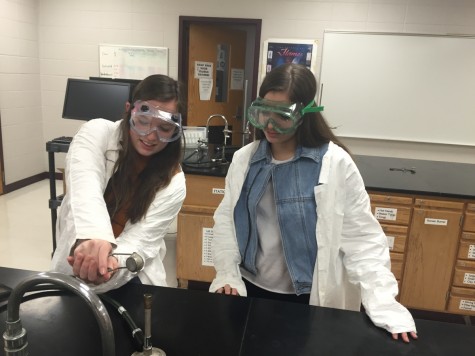Four years of science should be required to graduate
January 27, 2016

While perusing through your graduation requirements and preparing with great enthusiasm for the day you begin the pursuit of your potential career, you sigh with immense appreciation that the only subject you are required to study throughout all four years of your high school career is “English”. But haven’t you always been completely enthralled by the realm of science as well? Since when has science taken a back seat in education standards? We should be required to engage in four years of scientific coursework. Current graduation requirements imply that science carries less importance in regards to our future jobs. A majority of careers that have become prevalent in society and are considered “hot” careers, according to the WisCareers site, involve or are related to science. Think about it: researchers, doctors, instructors, farmers, gardeners, any athletic instructor, astronomers, astrophysicists, electrical engineers, plumbers, entrepreneurs, processing plant workers, and countless more careers all require scientific principles in some form. Additionally, everyone has heard that, “America has drastically fallen behind in terms of education and intelligence when compared to other industrial and first world countries.” By taking a good look at our graduation requirements, I believe it becomes rather clear as to why this predicament is occurring. Implementing more science classes will only improve this situation. Moreover, science instructs and fosters logical mental interactions, encouraging the inherent methodical process of thinking wired into the brain of us Homo sapiens. Through scientific principles, experimentation, processing collected or previously proven data, and more, one begins to effectively construct and synthesize arguments. When supporting a conclusion via pen and paper, arguments are constructed into concise compositions that any literature instructor would praise. And, we cannot forget that science includes mathematical processes as well. With that said, science encompasses all forms of education, including the kind of education where students do not simply mimic information presented, but where they form connections to material and begin to completely comprehend a topic. Overall, the imperativeness of science is downplayed in many education standards, including ours. Furthermore, science is life…literally! Everything can be explained by science in some form (whether the average human being can comprehend the justifications or not). This idea in itself is enough to baffle me. You don’t understand why you can’t correctly interpret literature, but you can perform insane calculus tasks? Neuroscience and biochemistry can formulate theories to explain your dilemma! You wonder why gravity is a constant force? You think you can travel faster than the speed of light? Both of these can be (or will be) explained by fundamental scientific theories of physics and chemistry. On top of this, our society would not be anywhere near where it is today without scientific inventions and breakthroughs. Reflecting just on the accomplishments within the medical field is astounding; then, try to fathom the immense influence science has played upon additional factors of our lives. Of course, there is always the argument that there should be room for alternative courses that allow students to pursue potential interests. However, students tend to look at these additional classes as “slacker” classes. Why provide a cheap alternative to a richer education? In addition, with the requirement of extensive science classes, Appleton North would be required to implement other science courses that would most likely be more focused and geared toward specific fields of study where general comprehension had already been established. It would not even be an option; for those incredible individuals who can hop immediately into biology or chemistry, they would need to be supplemented with further science opportunities to fulfill their fourth year of scientific work. With the “hot” careers involving scientific study, these courses of greater focus would allow students to pursue potential career interests without having to waste money in college. Ultimately, science has altered and enhanced our lives and the interpretation of our universe. There is no reason for education and graduation requirements to undermine the push for individuals to be better logicians, analyzers, synthesizers, and more competent people. As a student body, our graduation requirements need to reflect the types of people we intend upon being; we are losing out on greater opportunities to improve ourselves and our society.

